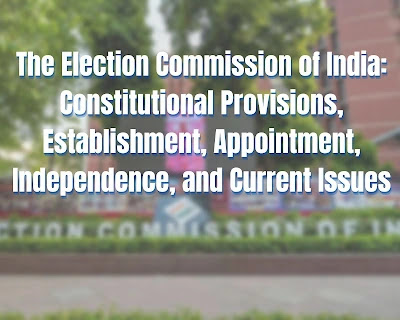 |
| Election Commission of India |
An Overview of the Election Commission of India: Constitutional Provisions, Establishment, Appointment, Independence, and Current Issues
The Election Commission of India (ECI) is a constitutional body responsible for the conduct of free and fair elections in the country. It was established under Article 324 of the Indian Constitution, which empowers the President of India to make regulations in consultation with the Chief Election Commissioner (CEC) for the conduct of elections to the Parliament and the State Legislative Assemblies.
Constitutional Provisions: Article 324 of the Indian Constitution vests the power of superintendence, direction, and control of elections in the hands of the Election Commission. The President of India appoints the Chief Election Commissioner (CEC) and other Election Commissioners (ECs). The CEC and the ECs hold office for a term of six years, or until they attain the age of 65 years, whichever is earlier.
Establishment: The Election Commission of India was established in 1950, shortly after the adoption of the Indian Constitution. The first Chief Election Commissioner was Sukumar Sen. Since then, the ECI has been responsible for conducting elections to the Parliament and the State Legislative Assemblies, as well as the office of the President and Vice-President of India.
Appointment: The Chief Election Commissioner and other Election Commissioners are appointed by the President of India.
Independence: The Election Commission of India is an independent body, with the power to conduct free and fair elections in the country. It is not subject to the control of the executive or the legislature. The ECI is also independent of the judiciary, although the Chief Justice of India is consulted in the appointment process.
Issues concerning appointments independence:
- The appointment of the Chief Election Commissioner and other Election Commissioners is not clearly defined in the Constitution, which has led to some controversies over the appointment process.
- There have been concerns that the appointment process is not transparent enough, and that the government has too much influence over the appointment of the CEC and ECs.
- There have been calls for the appointment process to be made more independent and transparent, with suggestions such as the appointment process should be done by a collegium of judges.
- Some have also proposed that the CEC and ECs should be appointed by a two-thirds majority of the Lok Sabha, similar to the appointment of judges in the higher judiciary.
Solutions:
- To address the issue of transparency in the appointment process, the government could make the minutes of the appointment committee meetings available to the public.
- A collegium of judges or other independent experts could be set up to recommend candidates for the position of CEC and EC.
- An appointment process which requires the approval of a two-thirds majority of the Lok Sabha, similar to the appointment of judges in the higher judiciary.
- The eligibility criteria for the appointment of the CEC and ECs can be specified in the statute.
- The term of office for the CEC and ECs can be specified in the statute.
- The removal process for the CEC and ECs can be specified in the statute.
Overall, the Election Commission of India plays a crucial role in ensuring the conduct of free and fair elections in the country.
The Election Commission of India (ECI) has implemented several new initiatives in recent years to ensure free and fair elections in the country. Some of these initiatives include:
- Voter-verified paper audit trail (VVPAT): The ECI introduced VVPAT in 2013 to increase transparency and accountability in the voting process. VVPAT is an independent printout of the vote cast by a voter, which the voter can verify before leaving the polling booth. The VVPAT slip is displayed on the electronic voting machine (EVM) for seven seconds, after which it drops into a sealed VVPAT box.
Electronic voting machines (EVMs):
The ECI has been using EVMs since 1999 to conduct elections in the country. EVMs are tamper-proof and ensure a faster counting process. The ECI has also introduced Voter-Verifiable Paper Audit Trail (VVPAT) system with EVMs to further increase transparency and credibility of the electoral process.
Model code of conduct:
The ECI has implemented a model code of conduct for political parties and candidates to ensure fair and peaceful conduct of elections. The code lays down guidelines for the conduct of campaigns and prohibits certain activities such as bribing voters, hate speech, and spreading false information.
Voter education and awareness:
The ECI has launched several voter education and awareness campaigns to educate citizens about their rights and responsibilities as voters, and to encourage voter turnout. The ECI also provides a wide range of voter education materials such as brochures, posters, and videos in multiple languages.
Social media monitoring:
The ECI has set up a social media monitoring cell to keep a check on the spread of false information and hate speech during elections. The cell monitors social media platforms such as Facebook, Twitter, and WhatsApp, and takes action against violators of the model code of conduct.
Systematic Voter's Education and Electoral Participation (SVEEP):
The ECI has launched this program to increase voter turnout, particularly among young voters, women, and marginalized communities. The program includes voter education and awareness campaigns, and initiatives to increase accessibility and inclusivity of the electoral process.
Webcasting:
The ECI has implemented webcasting of polling stations to ensure transparency and accountability during the voting process. Webcasting allows for real-time monitoring of polling stations by the ECI and political parties, reducing the possibility of malpractice.
Overall, these new initiatives have helped the ECI to conduct free and fair elections in the country and have increased transparency and accountability in the electoral process.

![GPSC 2021-22 English Paper Solution [ ENGLISH MEDIUM ] Adv.No: 30/202122](https://blogger.googleusercontent.com/img/b/R29vZ2xl/AVvXsEhjabwOA006ezMSImrgRIFS_VY9JLaKB0wCHC6ZAsum5ODmo6NljFLe_3f6ZKtWivX3vHEDx41PurOz6Y1R4PozZW6JWz-QHQZ0-I8WM0McImYdh0l4PeawXqfVE2UwiAGvKodKTv9uhCinJN0-NZSgpxFHajGE70VMeBVhSm31Gz9TfSLab7HeH569tw/w680/eng1.jpg)




0 Comments